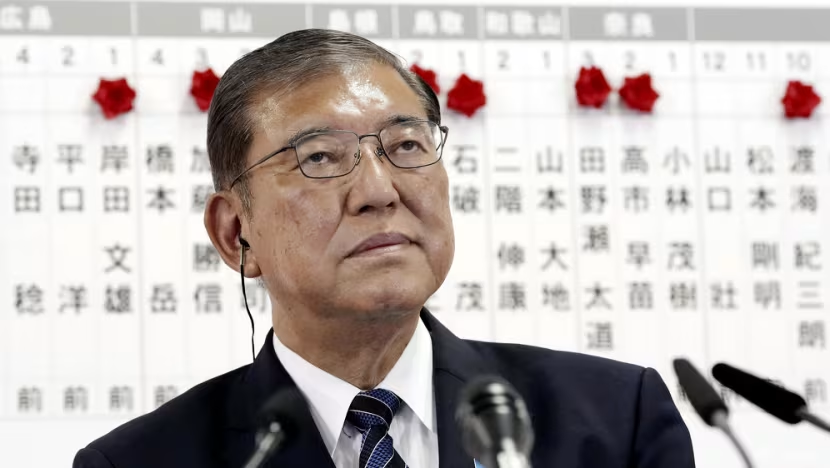
TOKYO, Oct 29, 2024 (AFP) - Japanese Prime Minister Shigeru Ishiba's ruling party was reportedly locked in talks to form new alliances Tuesday after losing its parliamentary majority in an election debacle.
The Liberal Democratic Party (LDP), which has governed Japan almost non-stop since 1955, and coalition partner Komeito fell short of a majority in Sunday's election, official results confirmed Tuesday.
Ishiba said Monday he would not quit despite his party's worst election result in 15 years, indicating he would head a minority government as he was not considering a broader coalition "at this point".
But media reports on Tuesday said the LDP was talking to opposition parties about arrangements to ensure Ishiba can get legislation through -- and also remain prime minister.
Together with the Komeito party, the LDP won 215 of parliament's 465 lower house seats.
One potential kingmaker is the Democratic Party for the People (DPP), whose 28 seats would push the LDP-Komeito coalition over the 233-mark for a majority.
According to the Yomiuri newspaper, Ishiba has decided to seek a "partial" coalition with the centrist DPP, whose manifesto included subsidies for reducing energy bills.
"If there is a request for talks between party leaders, there is no reason to reject it, though it depends on what we will discuss," DPP leader Yuichiro Tamaki said Tuesday.
"Talks between party secretary generals are currently taking place and there are various communications... but I don't feel like anything concrete is proceeding," he said.
An LDP official declined to comment when contacted by AFP.
"Since (Ishiba's) press conference yesterday (Monday), we have not officially announced anything," the official said, requesting anonymity as they were not authorised to speak to the media.
- Fragmented opposition -
Ishiba is also considering asking the DPP for support when parliament votes on whether he will continue as prime minister, the Yomiuri reported.
Parliament has to convene by November 26 -- 30 days after the election. The vote could take place on November 11.
But also likely courting the DPP in a bid for the premiership will be Yoshihiko Noda, head of the Constitutional Democratic Party (CDP), whose seat tally rose from 96 at the last election to 148.
This appears less likely, given that the opposition comprises eight different parties ranging right across the political spectrum from communists to nationalists.
"The possibility of a handover of power to the opposition isn't zero, but there are far too many opposition parties for any of them to reach a majority," said Yu Uchiyama, political science professor at the University of Tokyo.
If no one wins in the first round of voting for premier, the top two go to a runoff.
The winner of that vote then becomes prime minister, whether or not they have a majority.
- 'Punishing' politician -
Ishiba, 67, vowed Monday to implement reforms to overcome "people's suspicion, mistrust and anger" after a party slush fund scandal in the LDP, a major reason for its poor election result.
In the Tokyo district of Itabashi, LDP heavyweight Hakubun Shimomura won nine straight elections before being suspended over the scandal, running as an independent and losing on Sunday.
"It was kind of my way of punishing him," local voter Yayoi Magara, 70, who used to back Shimomura but who cast a blank ballot, told AFP.
Japanese businesses are concerned about the potential for parliamentary paralysis holding up reforms aimed at jumpstarting the world's fourth-largest economy.
Syetarn Hansakul from Economist Intelligence said the LDP's poor election showing and "reduced political clout" could dent "investors' confidence in Japan's political and economic outlook".
On Monday, the yen hit a three-month low, partly on fears that the political uncertainty might stop or delay the Bank of Japan increasing interest rates.
"(Although) Ishiba appears to appreciate fiscal discipline, he will likely continue to compromise and refrain from discussing additional revenue measures even though they are important in the long run," said Shigeto Nagai at Oxford Economics.
The chairman of the Japan Business Federation on Sunday urged political parties to focus on policies to grow the economy and overcome current challenges.